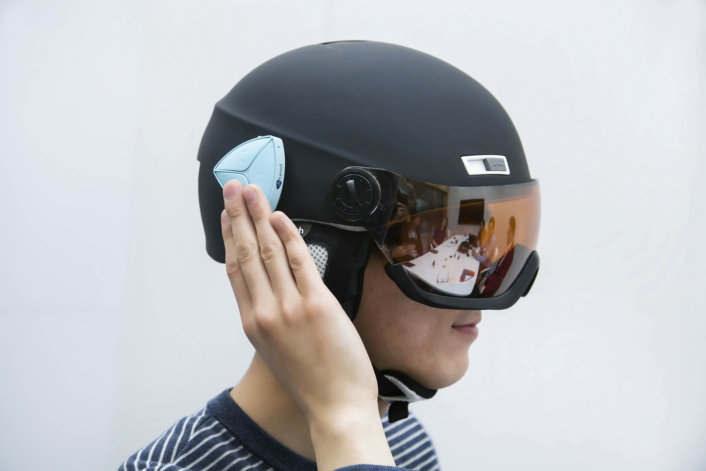
Ahead is a project of Samsung’s C-Lab skunkworks, and it was unveiled at the company’s Developer Conference earlier this year. It’s a small, triangular device that affixes to a helmet via “super-strength” magnets. It pairs with a smartphone via Bluetooth to make and take calls, receive voice notifications, and play music, and sports hardware buttons for adjusting volume, changing music tracks, and dismissing alerts.
But here’s the unique bit: it uses “oscillators” and twin noise-measuring microphones to produce a “surround sound” effect without silencing the environment around you — think open-ear headphones. A Push to Talk (PTT) version supports voice sessions between multiple devices over a two-way radio link.
That’s the current incarnation of Samsung Ahead, but the company’s patent filing is a bit broader in scope. It describes an operating system for a “digital electronic device” that sports built-in support for “electronic display modules” like a screen, plus headphone hardware capable of “MP3” and “MP4” playback and “digital communication.” Cameras capabilities get mention, too — the patent references peripherals like “digital camera” and “camcorders.”
Just what form future Ahead devices might take is a total mystery — the application refers to the hardware alternately as “wearable computers in the shape of a helmet” and “wearable digital electronic devices comprised primarily of smart phones in the shape of a helmet.” But they share one thing in common: smartphone connectivity. According to the filing, an Ahead headset would rely on a form of “wireless” for “portable instant messaging.”
This is not the first time Samsung has toyed around with the idea of augmented reality headwear. In 2013, gadget blogger Eldar Murtazin reported that the company was actively developing a head-mounted display similar to Google Glass, and that it would debut under a new “Gear Glass” brand in March or May of that year.
Those predictions never came to pass, but an application unearthed some time later by The Wall Street Journal showed a pair of translucent lenses with built-in earbuds, clickable side buttons, a front-facing camera, and the ability to pair wirelessly with a nearby smartphone to “take phone calls and listen to music during workouts.” And in 2014, a rumor suggested that Samsung would unveil a Gear Glass headset — one running the company’s Tizen operating system, according to Business Korea — at IFA in September alongside its then-flagship handset, Galaxy Note 4. That never came to fruition, either.
Ahead will have to overcome some of the same obstacles that Google Glass has encountered. According to a 2014 Reuters report, Google Glass’s frustrating hardware limitations — a low-resolution screen, small battery, and weak processor, among others — led 9 out of 16 Glass developers to cease development on the platform. Lack of customers — a symptom of its niche appeal — played a part, too, as did a budding controversy over the heads-up hardware’s surreptitious recording capabilities. Bar and cafe owners instituted “Glass bans,” and services like Anti-Glass promised to disrupt any third-party facial-recognition apps a Glass user might be running.
On the other hand, the landscape has changed quite a bit since Google ceased public sales of Glass. The company is reportedly testing a revamped headset, a so-called “Glass enterprise edition,” with an upgraded screen and processor, folding hinge, waterproof design, faster Wi-Fi, and a snap-on battery pack.
This new Google offering is described as “durable,” and is bound for health care providers, warehouses, and other partners who will see the prototypical hardware used for hands-free tasks. Microsoft’s HoloLens, an augmented-reality headset with much the same capabilities, is similarly bound for enterprise applications: the Redmond company’s announced agreements with Case Western Reserve University, NASA’s Jet Propulsion Lab, and others.
Corporate applications could be the key to Ahead getting ahead. So could affordability — HoloLens retails for $3,000, and Google originally priced Glass at $1,500.


